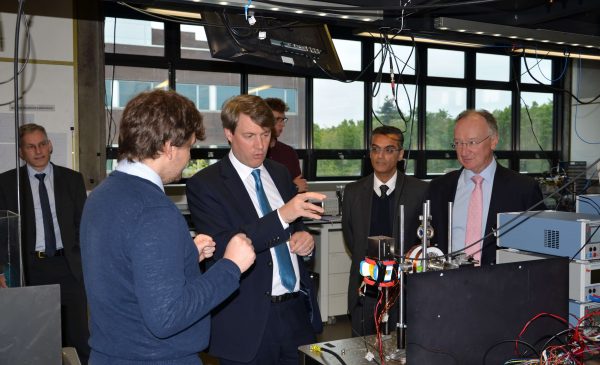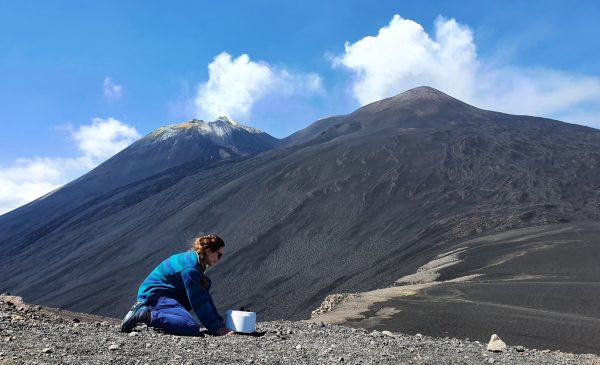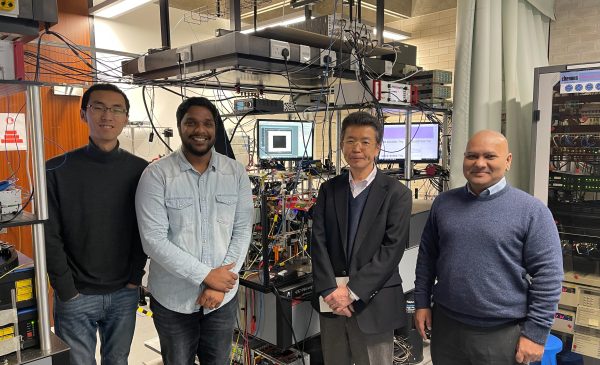The UK National Quantum Technology Hub for Sensors and Metrology were delighted to receive Chris Skidmore, Minister of State for the Department for Education and the Department for Business, Energy and Industrial Strategy, on Friday 17th May 2019.
The visit, led by Dr Simon Bennett, Director of the Quantum Technology Hub and Professor Andy Schofield, Head of College for Engineering and Physical Sciences, began outside the Metallurgy and Materials building for an introduction to the Gravity Pioneer project, which is funded by Innovate UK as part of the Industry Strategy Challenge Fund. This project, which was announced last year at the National Quantum Technologies Showcase, is led by RSK; the scientific leadership is led by the University of Birmingham.
The REVEAL project was also exhibited. This project, which is funded by Innovate UK and led by the University of Birmingham, aims to build a prototype industrial quantum gravity gradiometer, enabling engineers to conduct subterranean surveying to identify potentially life-threatening underground objects such as sinkholes and mineshafts before construction takes place.
The quantum gravity gradiometer was introduced by Professor Trevor Cross, Group Chief Technology Officer at Teledyne e2v, lead participant for the REVEAL project. A number of other industry representatives were also present, such as Professor George Tuckwell, Director at RSK, also a participant in the project, as well as representatives from BAE Systems and MBDA.
The delegation were then led upstairs for a tour of labs, beginning with a visit to the Gravity Gradients Lab, where the Minister was shown gravity instruments built by Quantum Technology Hub researchers with the invaluable help of industry collaborators.
After moving to the neighbouring lab, Dr Michael Holynski, Atom Interferometry Team Lead, introduced the gravity platform project and instruments, and its potential applications in defence and navigation. The CASPA project was also shown during the visit. This project aims to send satellites with sensors into space to monitor changes in the earth, meaning that it will be possible to predict earthquakes, floods and other geological disasters.
The delegation also visited the quantum clocks lab. Dr Yeshpal Singh leads the quantum clocks research at the Quantum Technology Hub, which aims to meet the growing demand from industry for more accurate and precise timing. Once the quantum clocks are fully developed and implemented, they will be hugely impactful for satellite navigation, high-speed internet and even with furthering efficiency in the banking/finance sectors, by enabling precise financial timestamps. The Hub’s work in quantum radar was also introduced by Professor Chris Baker, Chair of Intelligent Sensor Systems at the University of Birmingham.
The visit concluded with a short walk to the Centre for Human Brain Health, where the delegation met Co-Director Professor Ole Jensen, who, alongside Dr Matthew Brookes from the University of Nottingham, introduced the research into developing non-invasive brain imaging technology using Magnetoencephalography (MEG).
Professor Jensen spoke about the aim of miniaturising the current brain imaging technology whilst increasing its sensitivity, meaning that the final product will be accessible and can be easily obtained to be used in hospitals and GP surgeries.
Quantum sensors will have a huge sector-wide impact, and its real implementation into everyday life is not too far away, thanks to close industry collaboration. This was the primary message which formed the basis of the visit: from construction to diagnosis and even space, it is imperative that quantum sensor research remains a priority research area across government, industry and academia.




